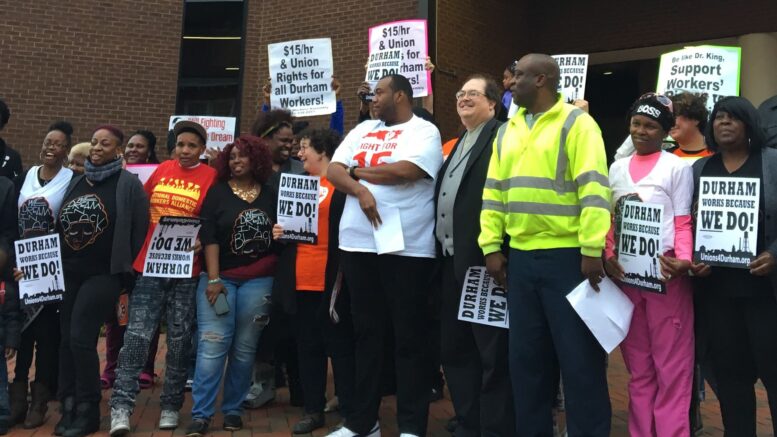By Carl Hintz
On October 22nd, 2024, the Durham Workers Assembly met at Durham People’s Solidarity Hub. Twenty-four people were in attendance.
The meeting started with time for attendees to socialize and share a dinner of chicken, rice and beans, green beans, and plantains. One of the strengths of the Workers Assembly model is that it brings together workers from different sectors. For example, restaurant workers, Amazon workers, retail workers, nurses, and public employees were there.
Another strength of the Workers Assembly model is that in addition to the immediate concern of workplace labor organizing, the assembly creates a space for workers to learn about and discuss important issues of the day. The focus of the October 22nd meeting was how environmental concerns impact workers, such as the devastation from Hurricane Helene and the risk that dangerous heat poses. Both hurricanes and heatwaves are more severe because of climate change caused by burning coal, oil and gas.
Several organizations provided updates on their labor organizing efforts. The newly-formed Durham Food and Beverage Workers United is organizing at various businesses in Southpoint shopping mall. REI Co-op workers are pushing for their first union contract in Durham. Amazon workers at RDU1 in Garner are engaged in a union card signing campaign. Once more than 30 percent of the workers at RDU1 sign a union authorization card, Carolina Amazonians United for Solidarity and Empowerment (CAUSE) will be able to request a union election run by the National Labor Relations Board.
Duke Respect Durham is engaged in a campaign to push Duke University to make payments in lieu of taxes, called PILOT, to the city of Durham. The payments would help meet essential needs such as funding for schools, affordable housing, transportation, and better pay for city workers.
Durham Workers Assembly is affiliated with the Southern Workers Assembly which is a network of local unions, worker organizations, and organizing committees. Participating individuals and organizations are brought together by the shared goal of building rank-and-file democratic unions in the U.S. South.
Megan Shan, a REI Co-op worker, said that the Durham Workers Assembly was helpful to her co-workers’ efforts to unionize with UFCW and to fight unlawful retaliation. For example, worker assembly members showed up to picket lines during the May 2023 strike. Unfortunately, a worker who was wrongfully placed on administrative leave was later fired, and has yet to be reinstated.
The strength of unions is proven in recent strikes. Communication Workers of America secured a 19 percent wage increase over the next five year contract which covers 17,000 AT&T workers in North Carolina, South Carolina, Tennessee, Georgia, Kentucky, Louisiana, Florida, and Alabama.
The International Longshoremen’s Association (ILA’s) three-day strike at the start of October changed the United States Maritime Alliance’s tune. Before the strike, USMX was unyielding on the issue of wages and automation. ILA’s October strike will likely help to increase the concessions that USMX is forced to make to port workers when their extended contract ends on January 15, 2025. The October strike also demonstrated the power of organized workers in strategic sectors of the economy as billions of dollars of U.S. imports came to a halt on the first of October.
Felicia Wang from Sunrise Movement Durham shared information about how Hurricane Helene has impacted workers. Applications for unemployment have spiked, particularly among hospitality industry workers in Western N.C.
Hurricane Helene was especially destructive because of climate change. Increased rainfall and flooding is enabled by warmer air temperatures caused by burning coal, oil, and gas. Hurricanes strengthen more rapidly because of warmer ocean temperatures, also caused by greenhouse gas pollution. One factor that contributed to the landslides in Western North Carolina was a period of low rainfall that preceded the storm. Droughts are now more frequent due to climate change.
Rapid intensification of hurricanes make evacuation efforts more difficult and lead to a higher death toll. Additionally, building codes fail to address the risks posed by climate-fueled extreme events such as hurricanes and heavy rainfall, leading to more death and destruction.
One attendee shared how the extended loss of electricity was life-threatening for some folks with disabilities. Buried transmission lines, rooftop solar, and battery storage would help to improve resilience during disasters such as Hurricane Helene. We can expect similar disasters in the future with increased frequency and severity.
Dante Strobino, from UE150, shared information about the proposed OSHA heat rule, “Heat Injury and Illness Prevention in Outdoor and Indoor Work Settings.” The OSHA heat rule is critical because of the number of workers exposed to dangerous heat both inside and outside in North Carolina.
Each year, workers die due to heat-related illnesses such as heat stroke. Unfortunately, there is no law or policy that protects workers against extreme heat. It is important for members of the public to make public comments in support of the proposed OSHA rule. Industry groups are likely to oppose the heat rule, just as industry groups opposed standards to ensure air quality that would prevent the spread of infectious disease in workplaces.
The deadline for public comment on the proposed Occupational Safety and Health Administration rule is December 30th, 2024. Please make a public comment before the deadline by going to regulations.gov/commenton/OSHA-2021-0009-4761.
In addition to making public comments in support of the OSHA heat rule, workers and community members can help build the labor movement in North Carolina by attending workers’ assembly meetings and by volunteering with labor organizing efforts such as those at RDU1 in Garner and at Southpoint shopping mall in Durham.
Carl Hintz is a contributing editor for the Triangle Free Press.

